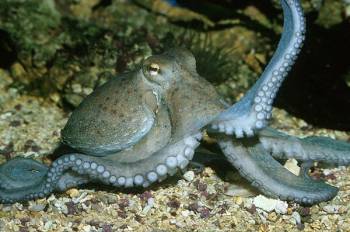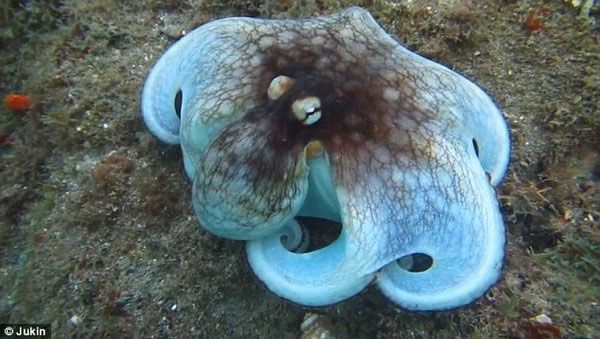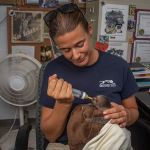The Ultimate Sacrifice: The Four-Year Vigil of the Deep-Sea Octopus Mother

Deep beneath the ocean’s surface, in the crushing pressure and perpetual twilight of the abyssal zone, life is a slow, enduring phenomenon. Here, where temperatures hover near freezing and time seems to stand still, unfolds one of the most profound acts of maternal devotion known on Earth: the four-year vigil of the deep-sea octopus mother.

This is the story of a specific species, often the Graneledone boreopacifica, a creature that undertakes a commitment so absolute it defies our common understanding of survival.
After laying her clutch of hundreds of teardrop-shaped eggs deep within a secluded crevice—sometimes attaching them to rocks near protective hydrothermal vents—the mother begins her silent, relentless watch. For the next 53 months, or over four years, she enters a state of complete, unwavering self-denial.
The Unwavering Watch
For the entire duration, she does not eat, does not hunt, and barely moves. Her sole existence is dedicated to the survival of her progeny. She spends her energy constantly guarding the eggs from predators, meticulously cleaning them by blowing water over the delicate capsules to ward off algae and bacteria, and shielding them from any physical harm.
With every passing month, the mother gives a little more of herself. Her strength, accumulated over a lifetime, is slowly consumed. Her once vibrant color fades to a pale, ghostly hue. Her eyes, fixed in an eternal vigilance, grow cloudy. Her body shrinks, metabolized by her own system—a slow, controlled self-cannibalism that sustains her through the longest-known non-feeding period of any animal.
This profound act is not a conscious decision driven by emotion, but a hard-coded biological imperative—a life legacy written entirely in sacrifice.
A Legacy Written in Life

The deep sea’s cold temperatures mean the gestation period is stretched to an astonishing length, ensuring that when the tiny octopuses finally hatch, they are fully developed and equipped for life in the unforgiving deep.
Finally, after more than 1,500 days of patient darkness, the long vigil ends. Hundreds of miniature octopuses, perfectly formed and ready to navigate their world, emerge from their casings and drift away into the vast ocean. Her mission is complete.

As her children swim free, the mother octopus, a mere shadow of her former self, closes her eyes. Her strength entirely depleted, her final breath taken, she gently loosens her hold on the rock and drifts away. She leaves behind a profound, unspoken message.
In a world where love is often articulated through grand gestures and spoken words, the deep-sea octopus mother teaches us what true, essential love really means: the selfless act of giving everything, even your last ounce of life, for the survival and future of another. Her final moment is not an ending, but the ultimate beginning for the next generation.












